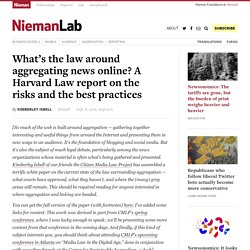

Content Curation & Fair Use: 5 Rules to being an Ethical Content Curator. * Update: I have a much lengthier updated post that incorporates the material below: Content Curation: Copyright, Ethics, & Fair Use Recently, Kimberley Isbell of the Nieman Journalism Lab cited a Harvard Law report and published an extensive post on news aggregation and legal considerations.

From a curation perspective, the whole article is interesting, but what was the most surprising was that her recommendations for being an ethical content aggregator, were the same as being an effective content curator. The five recommendations are below. You can read the full article for the legal justifications for abiding by these practices. However, I have provided some reason on why you would want to follow these guidelines from a content marketing perspective: 1. Marketing reason: The more you link to third parties, the more likely they are to link back to you – which ultimately improves your SEO. 2. 3. 4. 5. *Disclaimer: I am not a lawyer. What’s the law around aggregating news online? A Harvard Law report on the risks and the best practices. [So much of the web is built around aggregation — gathering together interesting and useful things from around the Internet and presenting them in new ways to an audience.

It’s the foundation of blogging and social media. But it’s also the subject of much legal debate, particularly among the news organizations whose material is often what’s being gathered and presented. Kimberley Isbell of our friends the Citizen Media Law Project has assembled a terrific white paper on the current state of the law surrounding aggregation — what courts have approved, what they haven’t, and where the (many) grey areas still remain. This should be required reading for anyone interested in where aggregation and linking are headed.
You can get the full version of the paper (with footnotes) here; I’ve added some links for context. During the past decade, the Internet has become an important news source for most Americans. What is a news aggregator? Can they do that? AFP v. Associated Press v. So is it legal? Fair Use of Online Content with Content Curation. Vous reprendrez bien un peu de curation à la sauce juridique? Calimaq poursuit la réflexion entamée dans un premier billet « Propulsion, Curation, Partage ».

Décidément, c'est fou toutes les discussions que suscitent ces liens que nous utilisons au quotidien pour les plus mordus d'info d'entre nous. Le billet que j’ai publié la semaine dernière : « Propulsion, Curation, Partage… et le droit dans tout ça ? » a suscité un certain nombre de réactions, commentaires, échanges, qui me donnent envie de prolonger la réflexion, en creusant plusieurs points sur lesquels on a attiré mon attention.
Propulsion, Curation, Partage… et le droit dans tout ça. Alors que Google vient d’annoncer le lancement de son bouton de partage +1, à l’image du fameux like de Facebook, la juriste Murielle Cahen publie sur le site Avocat Online une intéressante analyse, qui confronte ce type de fonctionnalités avec les principes du droit d’auteur à la française.

Son raisonnement, finement nuancé, tend à prouver que plusieurs principes du droit d’auteur, et notamment le droit moral, fragilisent ces pratiques de propulsion des contenus en direction des réseaux sociaux. Cela dit, il me semble que son analyse gagnerait à être complétée par la prise en compte du droit de courte citation, ainsi que d’une jurisprudence récente rendue à propos de l’exception de revue de presse. J’aimerais aussi, au delà de la question des boutons de partage et de la propulsion élargir la réflexion au domaine des nouveaux outils de curation des contenus, qui soulèvent à mon avis des questions encore plus épineuses de respect du droit d’auteur.
Sur le même thème.